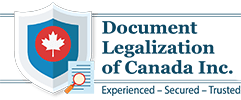You might be required to get an apostille on your documents if you intend to conduct business or reside overseas.
The following are the top 20 types of documents that frequently need a “apostille” in order to be used abroad:
| · Birth certificate | · Adoption documents |
| · Marriage certificate | · Power of Attorney |
| · Death certificate | · Passport copy |
| · RCMP Criminal record check | · Certificates of Origin and Commercial Invoices |
| · University degree | · Medical device licence |
| · College diploma | · Certificate of residency |
| · High School Diploma | · Incorporation documents |
| · Educational Transcript | · Manufacturer’s Declaration |
| · Divorce certificate | · Patent Application |
| · Single Status Affidavit | · Statement in lieu of certificate of non-impediment to marriage abroad |
By no means is this a comprehensive list of all the documents. If properly prepared, almost any kind of document can go through this process.
What is an Apostille?
Countries that have ratified The Hague Apostille Convention have agreed to accept documents issued by other signatory nations as long as those documents are authenticated with the addition of a “apostille,” an internationally accepted form of authentication. Apostilles guarantee that official documents issued in one signatory nation will be accepted as legitimate and lawful in every other signatory nation.
As of January 11, 2024, Canada has ratified the Hague Convention. Therefore, the formally used procedure that we refer to as “authentication and legalization.” is still valid for countries who is not part of the Hauge Convention.
How Does One Go About Obtaining Authentication and Legalization?
Authenticating your documents at Global Affairs Canada is a step in the legalization and authentication process. The diplomatic embassy of your destination country must then legalize them.
The requirements for the legalization and authentication of Canadian documents are fairly stringent, and they are shared by Global Affairs Canada and every diplomatic station. Additional requirements, including notarization or translation, can be necessary in some circumstances.
We would be pleased to talk with you about your circumstances and address any questions that you may have regarding the procedure or your documentation. Contact us by phone at 1-833-700-5342 (toll free) or fill the request for a quote





